This page is currently not regularly updated, because of the administrative decision to discontinue this service in the nearer future. Feel free to check by anyway, otherwise you could, for example, have a look at my IRIS page, which is currently still work in progress.
New book on its way
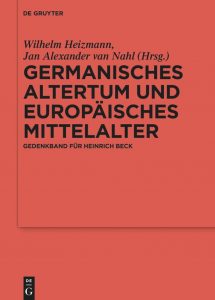 "Germanisches Altertum und Europäisches Mittelalter. Gedenkband für Heinrich Beck"
"Germanisches Altertum und Europäisches Mittelalter. Gedenkband für Heinrich Beck"
(Germanic Antiquity and the European Middle Ages: Volume in Memory of Heinrich Beck)
This volume brings together essays by friends and colleagues of Heinrich Beck, editor of the Encyclopedia of Germanic Antiquity Studies (RGA) and cofounder of the Supplementary Volumes to the RGA and the database Germanic Antiquity Studies Online (GAO), with topics ranging from early medieval archaeology, and Old Germanic and Old Norse literature, to linguistics, onomastics, runology, and medieval Scandinavian history.
More information here.
New Research Project: "The domestication of anxiety – Handling contingency in medieval Icelandic literature"
New publication: "Anne Holtsmark" in the Literary Encyclopedia
Anne Elisabeth Holtsmark (21 June 1896 [Christiania [today: Oslo]] – 15 May 1974 [Oslo]) was a Norwegian scholar of Old Norse and the first female professor at the historical-philosophical faculty at the University of Oslo. Her studies on Old Norse literature and mythology had a noteworthy impact on the field into the early twenty-first century...
van Nahl, Jan Alexander. "Anne Holtsmark". The Literary Encyclopedia 1.4.1. German-language Writing and Culture (1747-678X), ed. by Ármann Jakobsson et al. First published 28 November 2022.
New publication: "Walter Baetke" in the Literary Encyclopedia
Walter Hugo Hermann Baetke (28 March 1884 [Sternberg] – 15 February 1978 [Leipzig]), was a German medievalist whose manifold studies on the history of Germanic religions, Old Norse mythology, and saga literature had a significant impact on international Scandinavian studies. Baetke played an important role...
van Nahl, Jan Alexander. "Walter Baetke". The Literary Encyclopedia 1.4.1. German-language Writing and Culture (1747-678X), ed. by Gerhard P. Knapp et al. First published 28 November 2022.
New publication: "Heinrich Beck" in the Literary Encyclopedia
"Heinrich Beck (2 April 1929 [Dürrenzimmern] – 5 June 2019 [Aschheim]) was a German scholar in Old Germanic and Old Norse Studies, and a leading figure in the re-orientation of Germanic Studies throughout the second half of the twentieth century. He became internationally renowned ... "
van Nahl, Jan Alexander. "Heinrich Beck". The Literary Encyclopedia 1.4.1. German-language Writing and Culture (1747-678X), ed. by Gerhard P. Knapp et al. First published 17 November 2022.
New Publication: "Heimskringla" in the Literary Encyclopedia
"Heimskringla is the modern name for a medieval collection of Old Norse Kings’ sagas, which tell the story of Nordic kingship from mythical times to the late twelfth century. The name derives from ... "
van Nahl, Jan Alexander. "Heimskringla". The Literary Encyclopedia 1.3.4. Icelandic Writing and Culture (1747-678X), ed. by Ármann Jakobsson et al. First published 15 November 2022.
Sunnan af Frakklandi: Málþing um konungasögur til heiðurs François-Xavier Dillmann
Í tilefni af útkomu franskrar þýðingar hans á Ólafs sögu helga, haldið í Snorrastofu í Reykholti, föstudaginn 23. september 2022.
15:00: Jan Alexander van Nahl: Af hverju mistókst Óláfi Haraldssyni? Nokkrar athugasemdir um Óláfs sögu helga
Allir eru hjartanlega velkomnir!
New publication: "Wenn Ausländer an die Macht kommen" – Bemerkungen zu Flucht und Fremdheit in den Königssagas
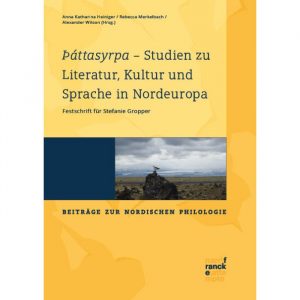 In: Heiniger/Merkelbach/Wilson (Hg.), Þáttasyrpa – Studien zu Literatur, Kultur und Sprache in Nordeuropa. Festschrift für Stefanie Gropper. Tübingen 2022, S. 219-228.
In: Heiniger/Merkelbach/Wilson (Hg.), Þáttasyrpa – Studien zu Literatur, Kultur und Sprache in Nordeuropa. Festschrift für Stefanie Gropper. Tübingen 2022, S. 219-228.
New publication/new publication series
Medieval Scandinavian Studies—Whence, Whereto, Why
(open access)
Medieval Scandinavian Studies started emerging as a discipline in the 19th century, at a time when Old Norse literature had become an important source both for the reconstruction of an alleged Germanic worldview, and the substantiation of national political claims. Scholars in the early 20th century consolidated this view, and thereby even coined public ideas of a Germanic past that became influential in the reception of the Middle Ages in general. To the present day, the popular fascination with these Middle Ages thus is strongly informed by Old Norse sources, and a wealth of recent adaptations seem to perpetuate this view. However, the same sources, as well as earlier scholarship, are used by extremist groups to substantiate populist and racist claims. Scholars in Medieval Scandinavian Studies find themselves at the intersection of these conflicting and yet connected spheres of appropriation.
This is the introduction to a series of articles, edited by me as special issue of the journal Humanities.
Hugvísindaþing 2022: Hending og óvissa í fornsögunum
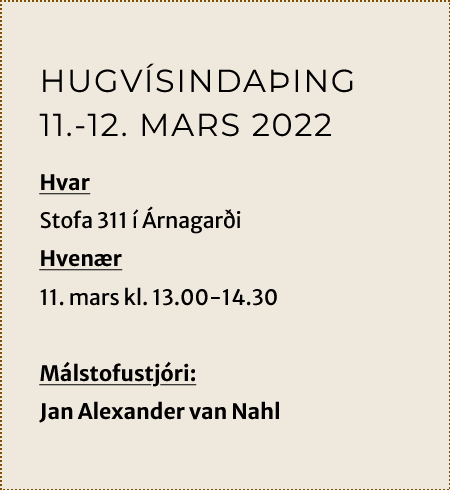 Breytingar og byltingar áttu sér stað í samfélagi, trúarbrögðum, vísindum og heimspeki allsstaðar í Evrópu fr.o.m. 12. öld. Bókmenntir á þjóðtungum hófust á sama tímabili í Mið- og Norður-Evrópu og óhætt er að segja að þróun þeirra sé tengd þeim breytingum. Staðan manneskjunnar í heiminum sýndist ekki lengur óbreytanleg, heldur voru nýir möguleikar fyrir hendi, en á sama tíma fólu þessar breytingar mikla óvissu í sér. Virðast bókmenntir hafa verið ein leið til að velta þeirri óvissu fyrir sér. Í málstofunni verður fjallað um mismunandi fornsögur í ljósi þeirrar áskorunar.
Breytingar og byltingar áttu sér stað í samfélagi, trúarbrögðum, vísindum og heimspeki allsstaðar í Evrópu fr.o.m. 12. öld. Bókmenntir á þjóðtungum hófust á sama tímabili í Mið- og Norður-Evrópu og óhætt er að segja að þróun þeirra sé tengd þeim breytingum. Staðan manneskjunnar í heiminum sýndist ekki lengur óbreytanleg, heldur voru nýir möguleikar fyrir hendi, en á sama tíma fólu þessar breytingar mikla óvissu í sér. Virðast bókmenntir hafa verið ein leið til að velta þeirri óvissu fyrir sér. Í málstofunni verður fjallað um mismunandi fornsögur í ljósi þeirrar áskorunar.
https://hugvisindathing.hi.is/malstofur/hending-og-ovissa-i-fornsogunum/
Public lecture: The Domestication of Uncertainty. A New Reading of the Old Norse Kings’ Sagas
March 10th, 4:30pm, Lögberg 101, everyone welcome!
I talk about core ideas in my newest book "Contingency and Chance in the Old Icelandic Kings’ Sagas" on occasion of this lecture in the Center for Medieval Studies at the University of Iceland. More information here.
On the radio: Mannlegi þátturinn
I speak with Þorgerður Ása Aðalsteinsdóttir about my current research on the role of darkness in the Sagas of Icelanders and in (medieval) Iceland; you can listen to it here.
On TV: Skemmtilegt spjall í "Saga & Samfélag" við Björn Jón

Samtal við Björn Jón Bragason um myrkur, konunga, miðaldirnar og sjálfan mig; þátturinn er hér.
Public lecture: Um hlutverk tilviljunar í norrænum konungasögum
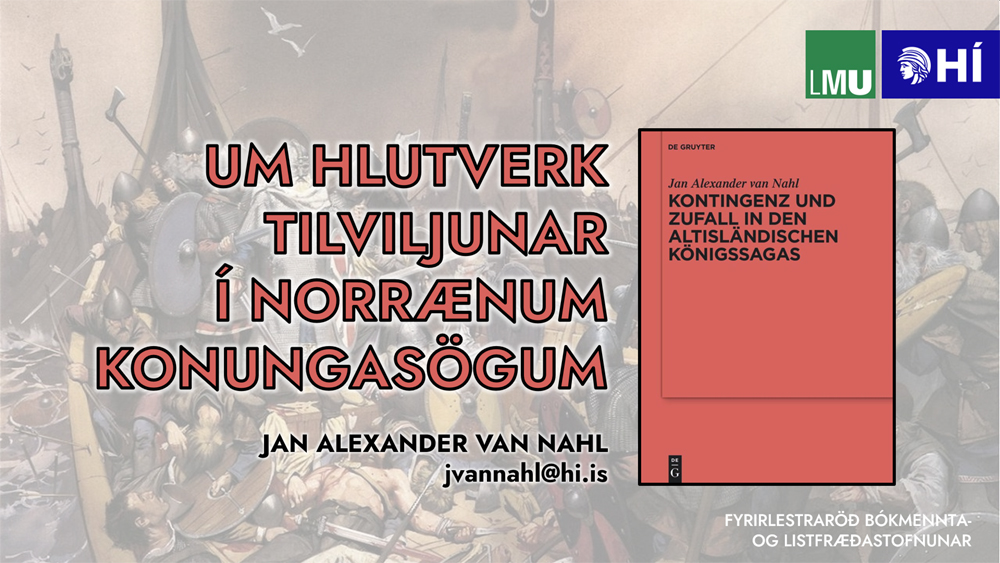
(The role of chance in the Old Norse Kings' sagas)


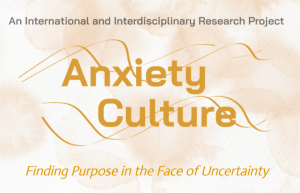 Part of the international and interdisciplinary research project: "Anxiety Culture: Finding Purpose in the Face of Uncertainty". More information can be found
Part of the international and interdisciplinary research project: "Anxiety Culture: Finding Purpose in the Face of Uncertainty". More information can be found